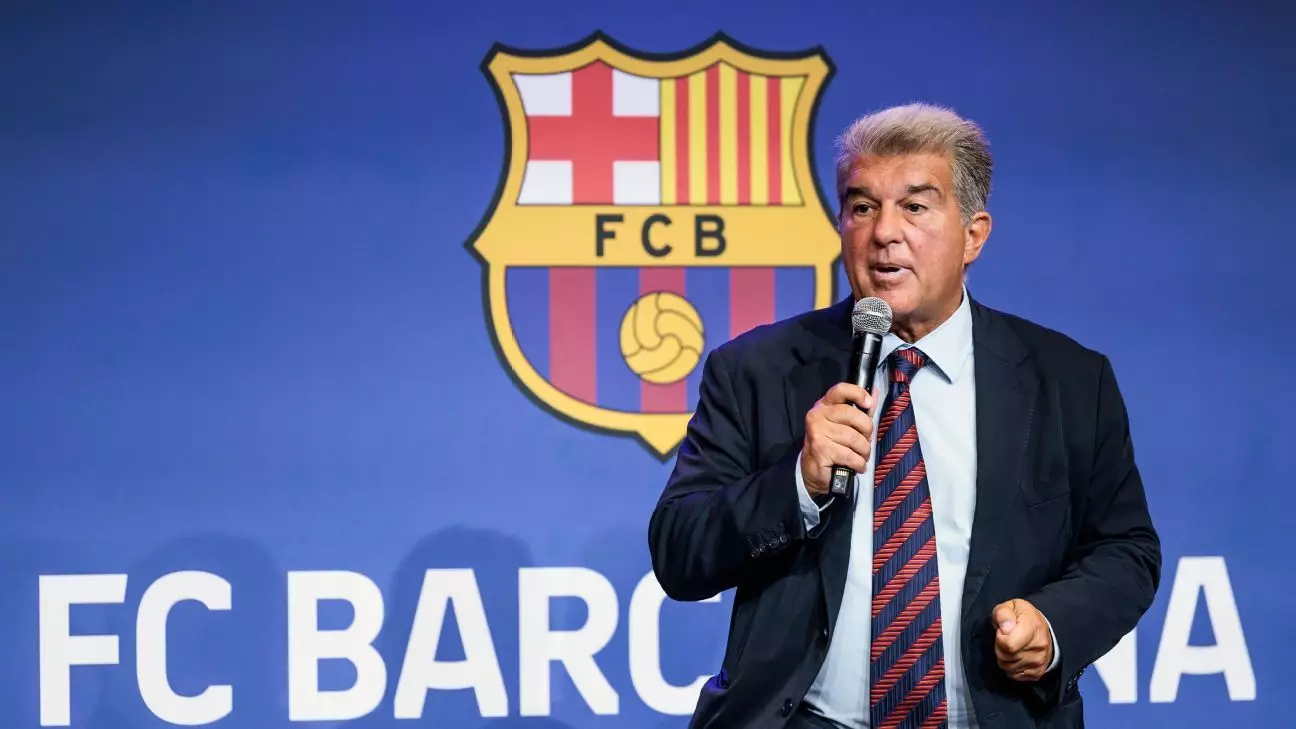In the world of sports, the management of a club plays an integral role in both its short-term and long-term success. The recent turmoil surrounding FC Barcelona is a stark reminder of how fragile this balance can be when mishandled. Under the leadership of president Joan Laporta, opposition groups have voiced their discontent following significant missteps concerning the registration of key players Dani Olmo and Pau Víctor. This turmoil has resulted in calls for Laporta’s resignation, raising questions about accountability and governance within the club.
Various factions, including Victor Font’s Sí al Futur and Joan Camprubí Montal’s Som un Clam, have united to present a collective front against Laporta. These groups accuse him of “negligence” after failing to meet the registration deadline for two pivotal players. Their shared discontent encapsulates a broader narrative that questions Laporta’s ability to lead effectively, especially as the club grapples with the repercussions of its financial decisions.
The dissatisfaction is not merely about the registration blunder; it stems from a culmination of controversial decisions. Critics point to the commission payments during the renewal of the sponsorship deal with Nike, the controversial closure of the singing section at the Olympic Stadium due to fan disputes, and the lucrative sale of VIP seats at Camp Nou. Each of these decisions paints a concerning picture of a leadership disconnected from the fanbase and the essence of the club’s identity.
The fallout from the registration fiasco intensifies as LaLiga and the Spanish Football Federation (RFEF) confirm that Barcelona cannot reregister Olmo and Víctor this season. Their inability to comply with the Financial Fair Play (FFP) regulations after missing the December 31 deadline exemplifies the ramifications of poor management. As Barcelona prepares to appeal this decision to the Consejo Superior de Deportes (CSD), the ramifications of these management failings are becoming increasingly apparent.
Nevertheless, the situation remains fluid; there are still hopes within the club that these players can contribute this season. Barcelona’s expected move to seek a “precautionary measure” to allow for Olmo and Víctor’s participation in the upcoming Supercopa is a desperate attempt to mitigate damage and maintain competitive integrity. Yet, the cracks in leadership are revealing themselves, as stakeholders are left pondering the reasoning behind these administrative missteps.
Behind the headlines, the internal atmosphere at Camp Nou is undoubtedly tense. Sources indicate that the affected players are not currently considering leaving the club, despite the frustration surrounding their registration status. Such sentiment gives a glimpse into the loyalty that players possess, but it also unveils a critical issue: the gap between club management and player welfare.
Contractual clauses allowing players to depart for free if not registered indicate significant vulnerabilities within the club’s operations. These stipulations reveal a concerning trend where players feel insecure about their status, which could lead to heavier repercussions in the transfer market if the situation does not improve.
For FC Barcelona, this moment represents more than just a crisis; it may serve as a pivotal inflection point for the future of the club. The outcry from the various opposition groups reflects not only dissatisfaction with management but also a broader desire for change. If Laporta fails to address these concerns, the threat of a vote of no confidence looms large, illustrating a potential shift in the club’s power dynamics and a yearning for leadership that prioritizes both efficiency and fan engagement.
The response from Laporta, while still unfolding, will be a significant determinant of the club’s trajectory. Whether he can salvage his presidency and restore faith in his leadership remains to be seen. However, the continuous struggle to marry ambition with accountability at FC Barcelona underscores an unwavering truth: good governance in sports can make or break a legacy—a lesson that cannot be overlooked as the club faces this critical juncture.
FC Barcelona’s current predicament is a sobering reminder of the intricate balance required in club management. As they navigate through these turbulent waters, the path they choose will not only define their present but also carve out the future of one of football’s most storied institutions.

Leave a Reply